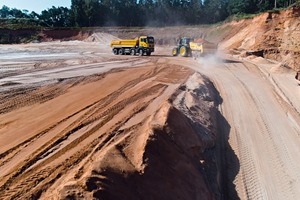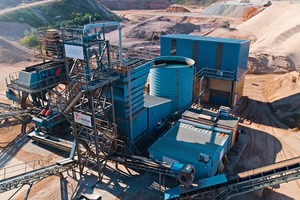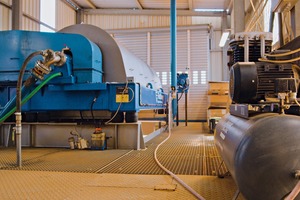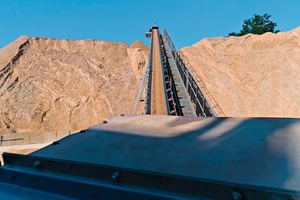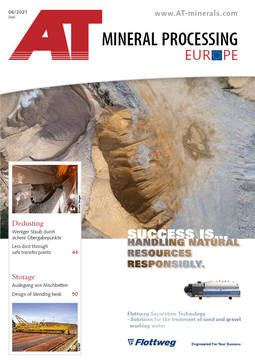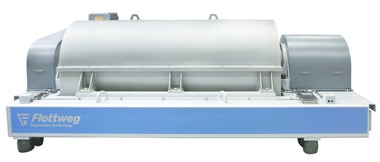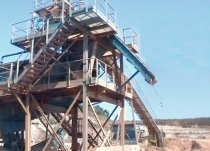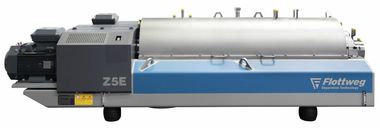Sand treatment with spin cycle
Adopting innovative procedures
Those responsible at the sand processing company Reithelshöfer GmbH near Nuremberg were also concerned about the recovery of water from sand processing and about the costs of large spoil heaps – for which it is now almost impossible to obtain permits – and about cost-effectiveness. The company has always been innovative in the way it tackles challenges, and several years ago its technicians were convinced that special attention should be paid to the treatment and purification of wash water. The people at Reithelshöfer then made a decision that was rather unusual in the industry, but quite innovative. In order to achieve a much more efficient treatment of the sand washing water and to avoid losing large quantities of water with wet sludge on the ever-growing spoil heaps, Reithelshöfer opted for a process that has long been standard in other industrial sectors: decanter centrifuge technology.
Flottweg’s decanter centrifuge was chosen in 2003. This company from Vilsbiburg in Bavaria is a pioneer in centrifuge technology and offers machines for separating liquids from solids for almost every conceivable application. Reithelshöfer uses the Flottweg Z92 model, which enables true parallel operation with its high separation capacity of up to 15 t/h. The advantage: During sand preparation, the centrifuge separates so much clean water from the used wash water that no run-on for washing water cleaning is required afterwards. The decanter centrifuge at Reithelshöfer is adjusted so that particles smaller than 25 µm are also separated from the water.
Flottweg’s centrifuge also scores points with further decisive advantages over other technologies. In contrast to chamber filter presses or belt filter presses, several of which would be needed in parallel to achieve approximately similar results, a single centrifuge is sufficient at Reithelshöfer. As a result, much less steelwork was required for the structure and the overall outlay in terms of procurement and installation was significantly lower. At the same time, the costs for maintenance and operation of just one machine are significantly lower. Since the decanter can dewater the sludge to up to 55 % dry solids in just one pass, intermediate storage of the thickened sludge in a holding tank is also no longer necessary. Due to the high degree of dewatering, the residual sludge can be transported directly from a bunker located under the machine with the wheeled loader.
The fact that centrifuge technology is a worthwhile investment is particularly noticeable in fresh water consumption, both economically and environmentally: Due to the significantly higher separation compared to other processes, much more water is returned to the production process. “With traditional separation methods, a fresh water supply of no less than 350 m3/h was required. With the use of the Flottweg centrifuge, recovery is significantly more efficient and we only need 20 m3 of fresh water,” explains Stefan Köhn, Managing Director of M. Reithelshöfer GmbH.
Potential savings through readjustment and low maintenance
For optimum performance, in order to maintain significant savings in water and space for overburden, the centrifuge must be constantly adjusted according to the consistency of the sludge to be dewatered. At the heart of this is the energy-saving Flottweg SIMP drive. The SIMP drive controls the differential speed between the decanter bowl and the internal screw according to the prevailing screw torque. The drive shaft of the gearbox is operated by a frequency-controlled motor, which allows the speed to be optimally adjusted. A second (frequency controlled) motor drives the decanter drum so that the mass moment of inertia to be overcome and regulates the bowl speed as required. Changes in the feed have an impact on the screw torque, since the screw must convey different amounts of solids which leads to different loads. The adjustment of the differential speed can be accomplished very easily and quickly with the SIMP-Drive, thus ensuring a consistently high dewatering of the sludge.
The SIMP drive and other components of the machine ensure that Reithelshöfer can calculate with very low maintenance costs. The closed system, which is designed for maximum load, runs autonomously and is largely maintenance- and wear-free.
“Flottweg’s decanter centrifuge has been in use at Reithelshöfer for many years now. The investment has paid off many times over in terms of water savings alone. And despite the harsh conditions and continuous use, the centrifuge has performed its duties without complaint to this day. Even during maintenance, there is not much more to do than occasionally changing a set of V-belts and replenishing oil for central lubrication. The decision to use Flottweg decanter centrifuges has more than paid off for us,” concludes Stefan Köhn.
Author:
Nils Engelke, Manager PR and Communication, Flottweg SE, Vilsbiburg/Germany
www.flottweg.com

